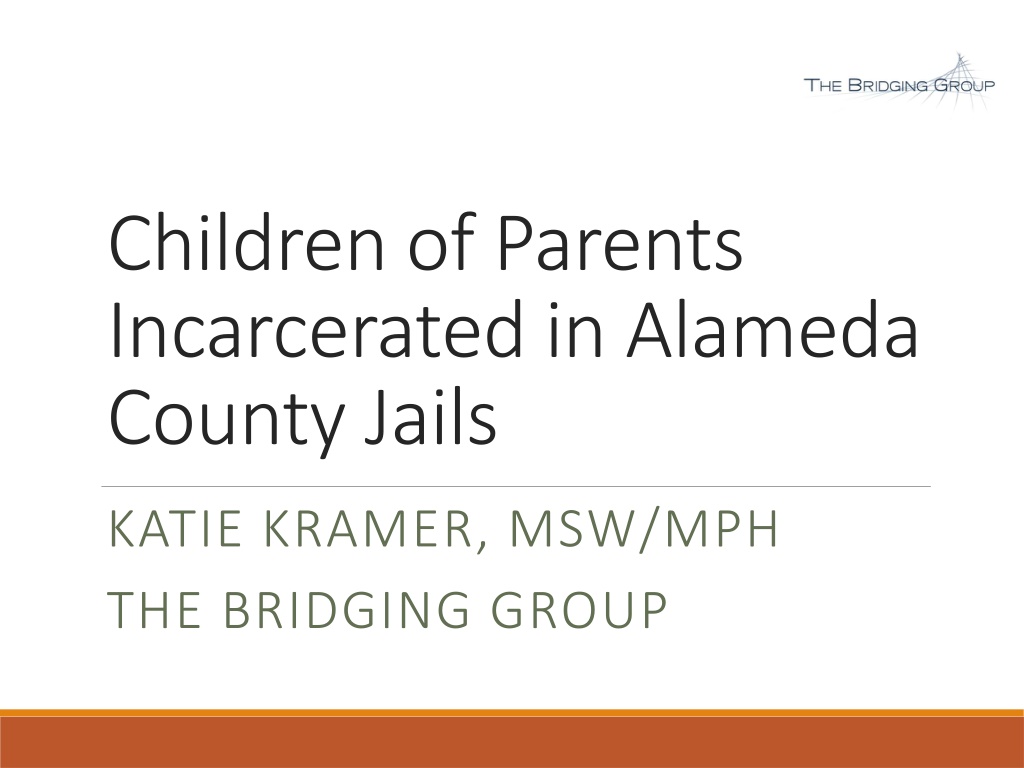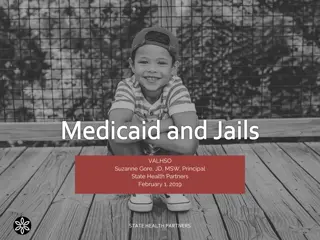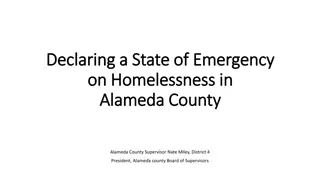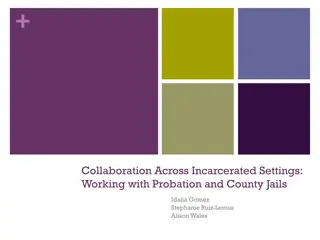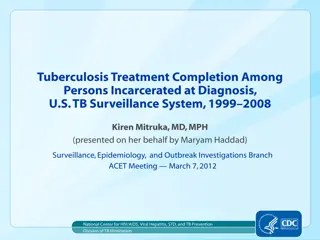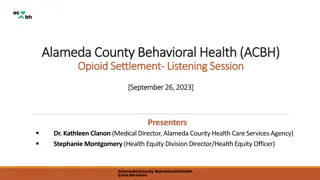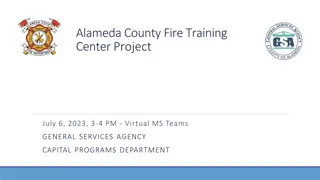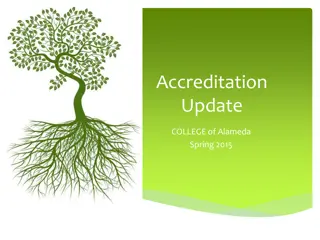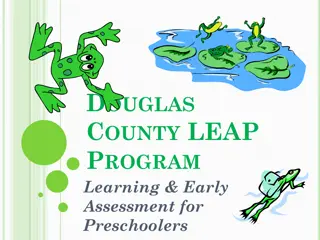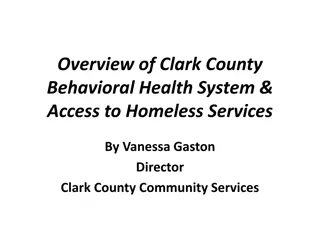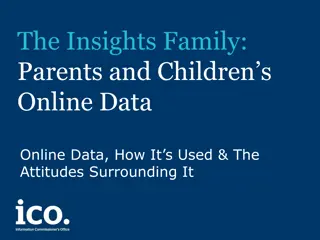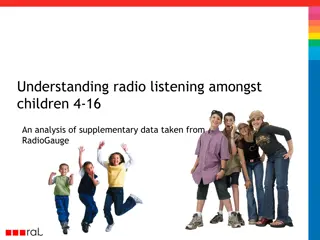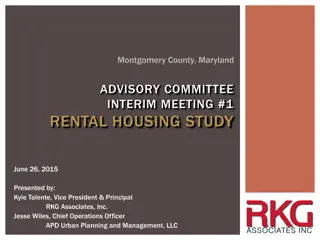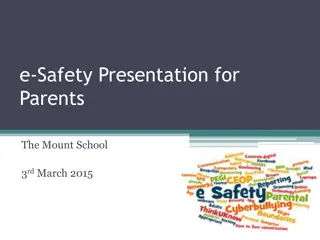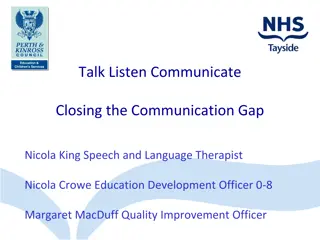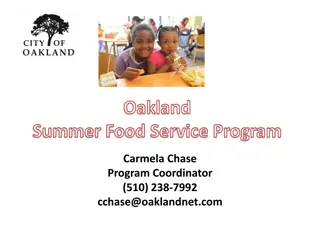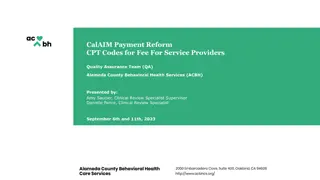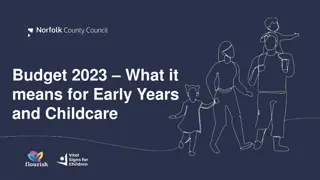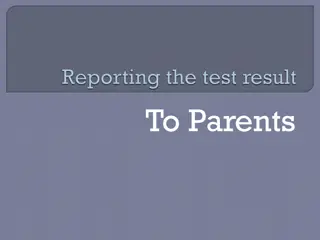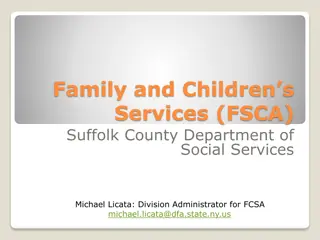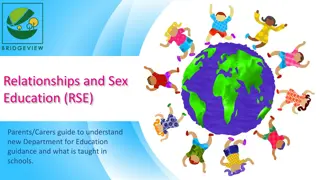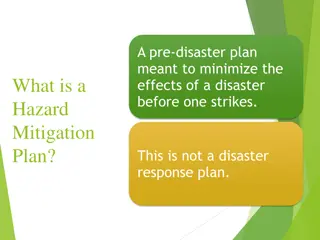Study on Children of Parents Incarcerated in Alameda County Jails
Study conducted in Alameda County reveals insights on parents' demographics, race/ethnicity distribution, total times incarcerated, parent-child information, and child demographics. Findings include participant demographics, custody information, and the impact of parental incarceration on children and families.
Download Presentation

Please find below an Image/Link to download the presentation.
The content on the website is provided AS IS for your information and personal use only. It may not be sold, licensed, or shared on other websites without obtaining consent from the author. Download presentation by click this link. If you encounter any issues during the download, it is possible that the publisher has removed the file from their server.
E N D
Presentation Transcript
Children of Parents Incarcerated in Alameda County Jails KATIE KRAMER, MSW/MPH THE BRIDGING GROUP
Alameda County Overview o 2,007 people offered surveys o 1,134 people completed surveys 57% completion rate opt in process o Jail Distribution 88% from Santa Rita 12% from Glenn Dyer o Language of Survey Distribution 95% conducted in English 5% in Spanish
Parent Participant Demographics (N=878)
Participant Demographics Participant Demographics 878 of participants (77%) were parents or primary caregivers for child(ren) 25 years Average # children was 2 (range: 1-10+) Among parents / primary caregivers: Average age was 31 years (range: 18-66) Gender 90% male 9% female 1% trans-male/female Language(s) Spoken 93% English 17% Spanish 0.6% Mandarin or Cantonese 6% Other language
Race / Ethnicity Race / Ethnicity Asian or Pacific Islander, 5% Latino, 22% White, 11% Mixed / Other, 10% American Indian or Alaska Native, 1% Black, 51%
Total Times Incarcerated Total Times Incarcerated Since Becoming a Parent Since Becoming a Parent 50% 40% 40% 29% 30% 17% 20% 13% 10% 0% 1 time 2-5 times 6-10 times 11+ times 43% reported their own parents have been incarcerated
Parent/Child Information Parent/Child Information Male Participant Female Participant 80% 66%* 64% 57% 60% 54%* 40% 29%* 25%* 20% 9%* 9%* 5% 3% 0% Have any custody of 1 child? Living with 1 child before arrest? 1 child involved in CPS? 1 child involved in justice system? 1 child's other parent in custody? *p<0.05 comparing male and female participants
Child Demographics (N= 1,781)
Child Demographics Child Demographics 1,781 Total # Children 25 years Average age was 8 years (range: 0-25) Gender o51% Male o49% Female Primary Language 92% English 7% Spanish 0.1% Mandarin or Cantonese 2% Other language
Race / Ethnicity of Children Race / Ethnicity of Children Asian or Pacific Islander, 4% Latino, 20% White, 10% Black, 45% Mixed / Other, 21% American Indian or Alaska Native, 1%
County Child Lives In County Child Lives In Bay Area, 74% Alameda County, 53% (same county as participant) Outside the U.S., 2% Contra Costa County, 8% San Francisco County, 6% Non-CA State in U.S., 8% Non-Bay Area CA County, 16% (San Joaquin, 5%) Other Bay Area County, 8%
Person Child Lives With* Person Child Lives With* Male Participant Female Participant 85% Other Parent 36% 7% Grandparent 23% 1% Sibling 10% 2% Other relatives 13% 3% Self 8% 1% CPS/Foster 2% 0.6% Non-relative 3% 0.1% Adopted 5% 0% 20% 40% 60% 80% 100% *p<0.05 comparing male and female participants
Child Demographics Child Demographics Male Participant Female Participant 70% 60%* 57%* 60% 46%* 50% 45%* 40% 26%* 30% 24%* 20% 7%* 7%* 10% 0% Participant has any custody? Living with participant before arrest? Involved in CPS? Other parent in custody? *p<0.05 comparing male and female participants
Childs Experience (N= 878)
Childs Experience Child s Experience Male Participant Female Participant 80% 69%* 60% 49%* 38%* 40% 28%* 19% 16% 20% 0% Any children present when arrested? Living with child's other parent when arrested? Family ever lost income because went to jail? *p<0.05 comparing male and female participants
Child Change Where Live? Child Change Where Live? Male Participant Female Participant 75% 55% 54% 50% 43% 41% 25% 4% 4% 1% 0% 0% 1 time 2-5 times 6-10 times 11+ times 28% of participants have children that had to change where they live because parent went to jail
Child Change Schools? Child Change Schools? Male Participant Female Participant 100% 75% 75% 58% 50% 37% 25% 13% 13% 4% 1% 0% 0% 1 time 2-5 times 6-10 times 11+ times 17% of participants have children that had to change schools because parent went to jail
Contact with Children (N=878)
Contact With Any Child? Contact With Any Child? Male Participant Female Participant 100% 86% 82% 75% 63% 60% 47% 50% 35% 25% 2% 2% 0% Phone calls Letters Visits Other 73% of participants have contact with at least 1 child right now (74% for males, 69% for females)
Barriers to Having Contact Barriers to Having Contact Male Participant Female Participant 60% 49% 50% 39%* 40% 34% 34%* 30% 21% 20%* 18%* 20% 14% 10% 0% Phone calls too expensive Costs too much to visit Caregiver won t allow contact Not good for child to have contact with me in jail *p<0.05 comparing male and female participants
Barriers to Having Contact (Cont.) Barriers to Having Contact (Cont.) Male Participant Female Participant 60% 50% 40% 29%* 30% 18% 17% 20% 14% 11% 11%* 10% 6% 5% 0% No money for stamps Don t know where child lives Child in foster care Other *p<0.05 comparing male and female participants
Visits With Any Child at Jail? Visits With Any Child at Jail? Male Participant Female Participant 94% 100% 92% 80% 60% 40% 20% 8% 8% 1% 0% 0% Contact Non-contact (in person) Video visiting 35% of participants have visits with at least 1 child at the jail (37%* for males, 19%* for females) *p<0.05 comparing male and female participants
How to Support Visits? How to Support Visits? 80% 65% 60% 40% 23% 20% 5% 5% 3% 2% 0% Want contact Extend visiting hours Help with transportation Easier to get & set-up visits Improve visiting environment Other
Reconnecting After Release Reconnecting After Release Concerns About Reconnecting After Release 80% 62% 60% 40% 26% 20% 7% 7% 7% 3% 0% Don t have resources to reconnect Don t know where child is living Have parole/ probation that prevent contact with child Geographic limitations CPS Don t know / No concerns involvement doesn t allow contact with child 96% of participants planned to reconnect with at least 1 child after their release
Additional Support for Child? Additional Support for Child? 60% 56% 48% 50% 42% 40% 35% 35% 30% 20% 10% 0% Positive family activities Recreational activities Support for basic life needs Counseling / therapy Homework / tutoring
Additional Support? (Cont.) Additional Support? (Cont.) 60% 50% 40% 30% 26% 20% 15% 12% 12% 11% 10% 0% Youth mentoring Mediation with child s caregiver Restorative justice work Help locating child Other
